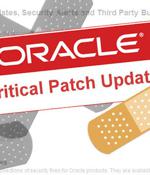Security News

Oracle on Tuesday released its Critical Patch Update for October 2020, which includes 402 new security patches released across the company's product portfolio. The advisory for the latest CPU includes information on the patches released after the previous CPU, but the patches are typically cumulative, Oracle notes.

"Oracle continues to periodically receive reports of attempts to maliciously exploit vulnerabilities for which Oracle has already released security patches," the database giant warned in its advisory accompanying its software patches. "In some instances, it has been reported that attackers have been successful because targeted customers had failed to apply available Oracle patches. Oracle therefore strongly recommends that customers remain on actively-supported versions and apply Critical Patch Update security patches without delay."

Business software giant Oracle is urging customers to update their systems in the October release of its quarterly Critical Patch Update, which fixes 402 vulnerabilities across various product families. "In some instances, it has been reported that attackers have been successful because targeted customers had failed to apply available Oracle patches. Oracle therefore strongly recommends that customers remain on actively-supported versions and apply Critical Patch Update security patches without delay."

The latest innovations help finance teams leverage touchless operations, predictive planning, and digital assistants to pivot towards growth. "Our newest innovations help finance teams rapidly adapt to the current economic climate, drive new business models, and improve strategic decision making; all designed to help our customers define their future."

Oracle announced that Rescale's cloud HPC simulation platform is now available on Oracle Cloud Infrastructure. The Rescale cloud HPC platform, built on a powerful high-performance computing infrastructure, seamlessly matches software applications with the best cloud or on-premises architecture to run complex data processing and simulations.

Oracle announced that it was chosen to become TikTok's secure cloud technology provider. "TikTok picked Oracle's new Generation 2 Cloud infrastructure because it's much faster, more reliable, and more secure than the first generation technology currently offered by all the other major cloud providers," said Oracle Chief Technology Officer Larry Ellison.

With these capabilities, Oracle is the only cloud service provider to offer a cloud security posture management dashboard at no additional cost, with numerous pre-built tools that automate response to reduce customer risk quickly and efficiently. Oracle Maximum Security Zones and Oracle Cloud Guard embed decades of enterprise security expertise and best practices into the Oracle public cloud in an autonomous fashion, accelerating customers' ability to ramp up to their cloud estate securely from inception.

Oracle on Monday announced the general availability of its Cloud Guard and Maximum Security Zones cloud security tools. Cloud Guard and Maximum Security Zones were some of the new security services univeled by Oracle in September 2019.

American tech giant Microsoft said Sunday its offer to buy TikTok was rejected, leaving Oracle as the sole remaining bidder ahead of the imminent deadline for the Chinese-owned video app to sell or shut down its US operations. The Wall Street Journal and The New York Times reported that Oracle had won the bidding war, citing people familiar with the deal, although the company did not immediately confirm that to AFP. But two Chinese state media outlets - CGTN and China News Service - said Monday that ByteDance will not sell TikTok to Oracle either, citing unnamed sources.

Data Intensity announced the launch of Safe-Switch, a life-cycle approach to migrating and managing Oracle applications and database platforms on Microsoft Azure. In response to the Oracle and Microsoft Cloud Interoperability Partnership announcement, Safe-Switch was created to help customers accelerate their consumption of heterogenous cloud adoption, with freedom of choice and seamless integration for Oracle and Microsoft workloads.